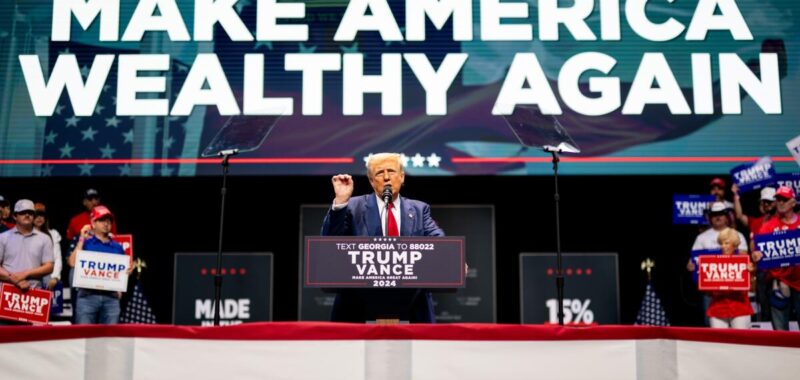You’ve heard it many times: A voter says they don’t like Donald Trump; they cite his nasty personality, divisiveness or penchant for saying stupid stuff. But then they say they’ll vote for him anyway: “Because I liked his policies.”
What policies? The voters rarely say, nor do reporters follow up. Curious minds, not least mine, want to know: What are they talking about?
Trump was by far the most ignorant on policy of seven presidents I’ve covered, and four years in office didn’t educate him: As former advisors attest, he refused to do homework, trusting to his instincts. Trump had positions on many issues, often ill-informed and wrong-headed. As president he executed policies, of course, though the best known — cutting taxes, for example, and seating right-wing federal judges — were largely the work of Republicans in Congress.
Filling in Trump’s policy vacuum was the impetus behind MAGA Republicans’ massive — and massively unpopular — Project 2025 blueprint for a second Trump term. But forget prospective policies. Does it really make sense to remember the Trump 1.0 initiatives fondly?
Are policies on the economy and immigration what these voters have in mind? Polls consistently show more voters prefer Trump over Kamala Harris in these areas.
First the economy: Trump inherited a growing one from the Obama administration, and left a pandemic-ravaged economy to Biden and Harris. His big edge in voters’ perceptions about economic matters reflects in large part their dismay over the rise in inflation on Biden’s watch, and the higher interest rates set by the Federal Reserve to tame it. But inflation has been a global problem, mostly a consequence of the spurt in post-pandemic demand for goods. Had Trump been reelected in 2020, he would surely have faced rising prices as well.
With prices still elevated, voters haven’t yet felt how much inflation has abated, faster here than in other nations, and just last week the Fed finally cut interest rates, and signaled more cuts ahead. Meanwhile, growth in the economy’s output and employment has been greater under Biden-Harris than under Trump, despite Trump’s lies and voters’ vibes to the contrary.
Trump had two main economic policies, and he’s now promising more of the same: tariffs, which raised prices on many goods Americans buy and cost jobs in import-reliant industries (Biden kept most of the tariffs in place, alas), and deep tax cuts that favored the rich and piled up debt. The $8.5 trillion in new debt that Trump ran up was twice as much as under Biden, and he did far less than Biden has done to trim annual deficits.
As for immigration: Yes, the influx of unauthorized migrants was lower under Trump and it spiked under Biden. But new restrictions have since reduced illegal border crossings to levels last seen late in the Trump administration. In any case, for all Trump’s false talk now about his wall and migrant crime, he in no way closed the border.
Those voters who have immigration in mind when they endorse Trump’s past policies should remember the forced separation of children from their families, without a plan to reunite them. Years later hundreds remain essentially orphaned, yet Trump last year celebrated his cruel achievement: “It stopped people from coming by the hundreds of thousands, because when they hear ‘family separation,’ they say, ‘Well, we better not go.’ ”
Perhaps Trump’s three Supreme Court picks and their votes to override Roe amount to a winner for a few voters, but most Americans oppose the 2022 ruling. At a rally on Monday in Pennsylvania, Trump crowed about Roe’s reversal. Despite mounting horror stories of women who’ve suffered or even died under new state bans, he said we ladies will “no longer be thinking about abortion” — “I will be your protector.”
On foreign policy, Trump was guided by his admiration for autocrats, especially Russia’s murderous Vladimir Putin. He rejected the U.S. intelligence community’s findings of Russian interference in the 2016 election, weakened NATO and other U.S. alliances and withheld military aid provided by law for Ukraine as Russia threatened to invade. Could those be the policies some voters have in mind? Let’s hope not.
We know they can’t be thinking of Trump’s major infrastructure initiative or his better, less costly alternative to the Affordable Care Act because, despite repeated promises, he never came up with even “concepts of a plan” for either. “Two weeks,” he’d say, and all would be revealed. We’re still waiting. Meanwhile Biden enacted an infrastructure program and expanded Obamacare.
Speaking of inaction, for four years Trump did nothing to acknowledge let alone mitigate climate change, even as its effects were increasingly evident in eroded coastlines, droughts, wildfires and extreme weather patterns. If a do-nothing policy is what some voters liked, they’ll certainly get more of that should Trump get elected: He’s vowed to dismantle Biden’s landmark climate law, with its clean energy projects, and “drill, baby, drill.”
Amid the biggest crisis of his term, Trump’s policy to deal with COVID-19 was ultimately malpractice: Delays and misfires have been deemed responsible for tens of thousands of preventable deaths. Trump spurred on the historic development of a vaccine against the disease, only to surrender to anti-vax sentiment. It was left to Biden to get shots in Americans’ arms.
Then there was Trump’s final policy as president: undermining faith in our elections and rejecting the peaceful transfer of power. Do the “I liked his policies” voters really want to see more of that, as they anticipate casting their ballots this fall?
The policy record is bad enough, but even a creditable Trump initiative shouldn’t offset voters’ concerns about his manifest character flaws. Those flaws by themselves merit a vote against the man. People thinking of going with Trump “anyway” should check their gauzy memories. And beware of Trump 2.0.
@jackiekcalmes

